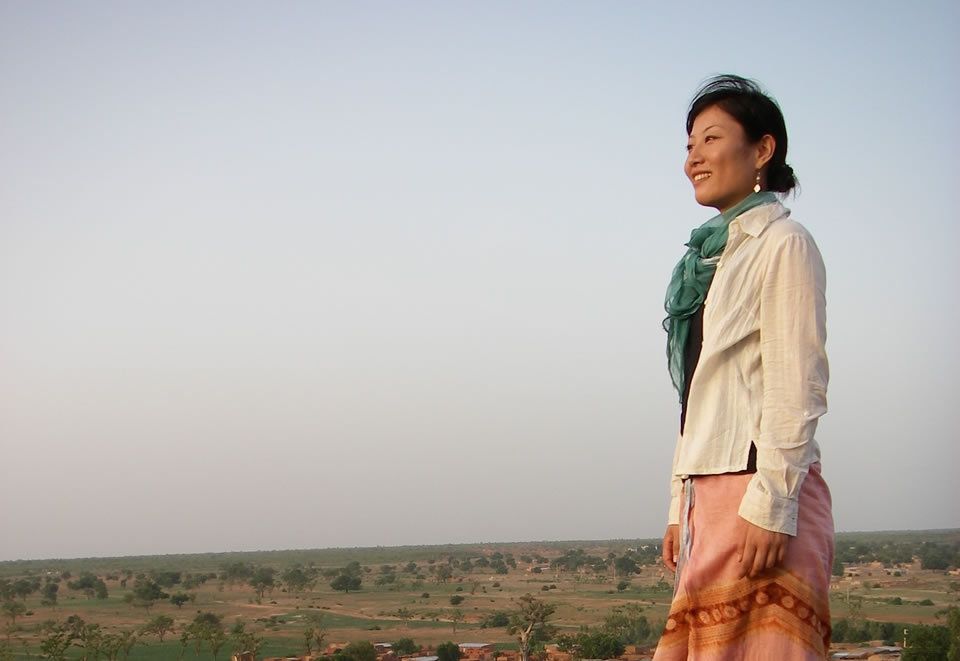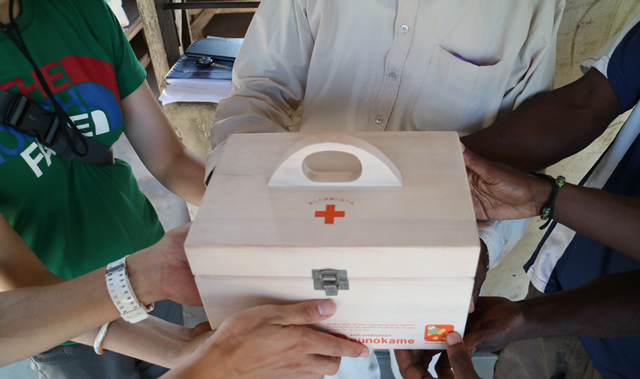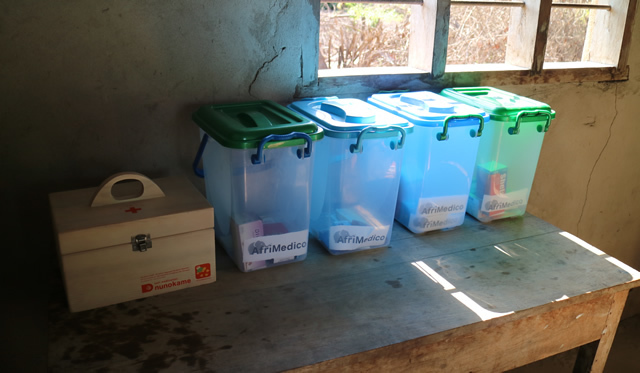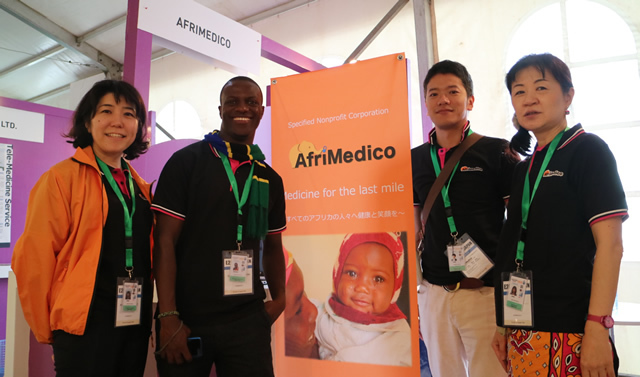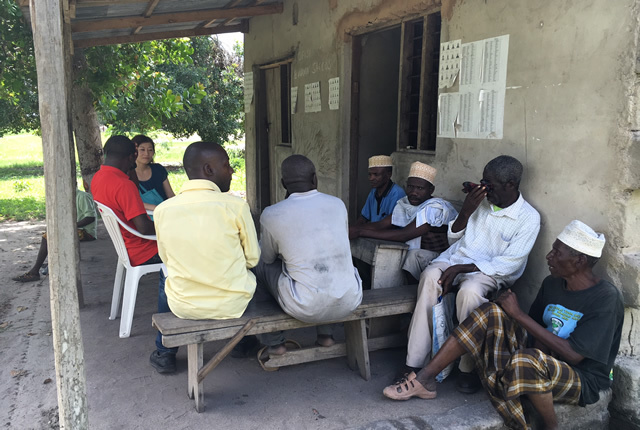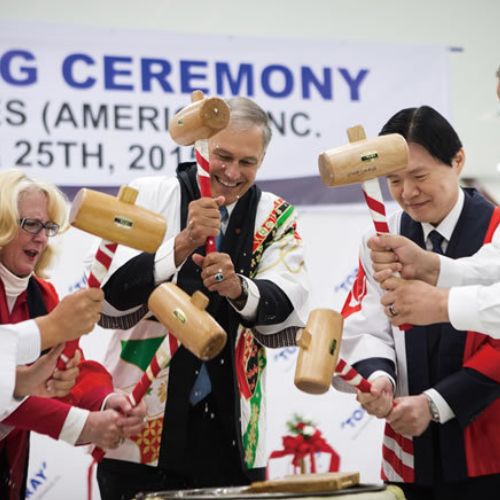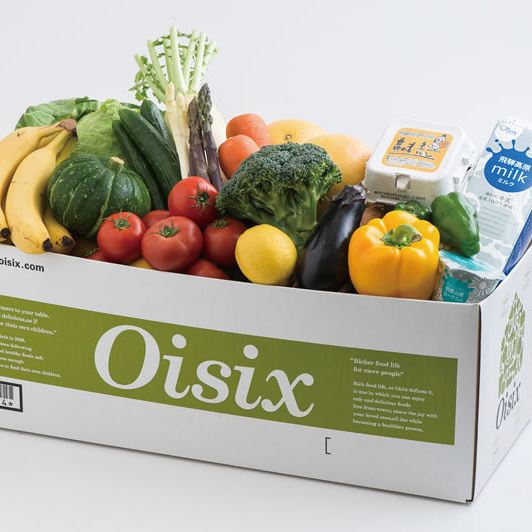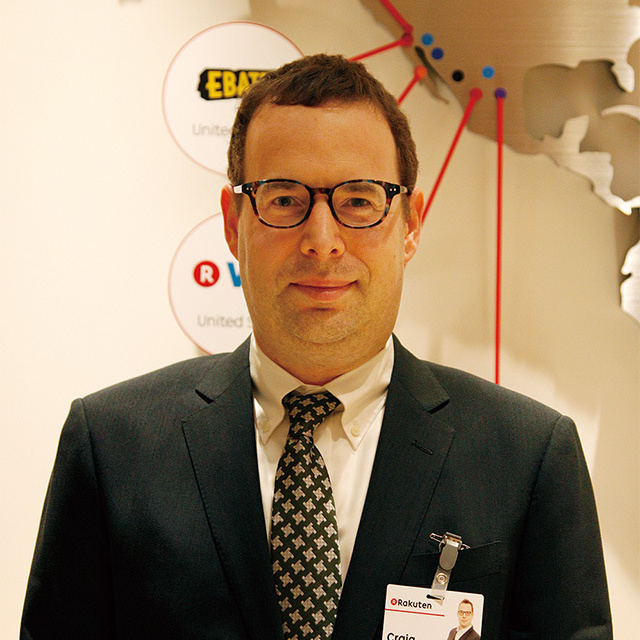With a history of over 320 years, “okigusuri” is a traditional Japanese “use first, pay later” sales method born in Toyama Prefecture, in which medicine is placed in a box at the home or workplace, and money is collected later for whatever medicine was used. AfriMedico is a non-profit organization that introduced this okigusuri system to Africa in order to deliver medicine to regions of Tanzania that lack sufficient medical care. This organization was founded by a Japanese pharmacist, Eri Machii.
AfriMedico’s okigusuri set consists of approximately 10 different medicine products. In addition to an analgesic and gastrointestinal agent, the kit contains insect repellant and a malaria testing kit to combat malaria.
An okigusuri set placed in a village. Payment for the medicine used is done by cell phone, using the “M-PESA” money transfer system. For the future, adding Japanese medicinal products to okigusuri sets is under consideration.
During her involvement in overseas volunteer activities when she was a college student, Machii decided to make more substantial contributions to the medical problems of developing countries. To help provide medical support to Africa, she left her job and went to Niger as a member of the Japan Overseas Cooperation Volunteers. At a clinic in Niger, she learned that medicine was not reaching the patients who needed it. Machii explains that “In Africa, travel and delivery expenses are high, making it difficult for people living in the deeper reaches of Africa to go to hospitals, and making the delivery of medicine to distant villages nearly impossible. As a result, these people could not be treated in the early stages and were left until their conditions worsened. This situation led me to thinking what could be done to deliver medicine to the people who needed them.”
Despite being able to impart medical knowledge to the people of Niger, reasons such as the economic situation of local communities made it impossible to improve their medical situation. Feeling inadequate to cope with the situation, Machii attended a graduate school of management upon her return to Japan to learn what sort of sustainable system could be run mainly by the local people. There she came up with an okigusuri business model that could let the locals take a larger role in caring for their own health. In past centuries in Japan, according to Machii, there were three factors that made okigusuri popular: underdeveloped infrastructure, lack of universal health insurance, and large families living together. Her research revealed that there are many places in countries such as Niger and Tanzania that fit these same criteria and have significant needs, leading her to consider them candidates for okigusuri systems. She figured that by transporting large amounts of medicine to various locations at once, she could keep transport costs down. Additionally, by using money earned through okigusuri at businesses in cities where there is high demand, she could provide a steady supply of medicine to remote villages at the same prices as those in the cities. In 2014, together with about 20 members who wished to contribute towards improving the medical situation in Africa, Machii established AfriMedico. With the advice of a network of local pharmacists in Tanzania, the organization commenced its activities.
At the Japan Fair, an exhibition held in conjunction with TICAD VI (Tokyo International Conference on African Development) in Nairobi, Kenya in September 2016. AfriMedico exhibits at various events to promote their activities and gather contributions.
The influence of the village chief is significant in Tanzanian villages. When introducing the okigusuri system, everything starts with a visit followed by discussions with the chief.
According to Machii, “AfriMedico has a local team of about 10 members consisting of Tanzanian pharmacists and nurses. This team is responsible for selecting the required medicines and visiting the households where the medicines are kept. Meanwhile, we of the Japanese team collaborate with Japanese pharmaceutical companies and conduct interview surveys in Africa as well as increase awareness there through events and other endeavors.”
At present, there are over 50 homes in villages of two Tanzanian provinces that are set up with the okigusuri system, which local communities have praised: “Symptoms can now be immediately alleviated with safe medicine thanks to the okigusuri system.” Although the system is finally on track, human resources and funds are issues to contend with in order to further expand the scope of this activity. Machii mentions that, “To strengthen our organization, we need to make more people aware of this activity and increase the number of our supporters.”
“For the future, we will increase awareness of anti-malarial countermeasures and sanitation through study groups and events as we try to achieve our final objective in which the local people can handle more of their medication themselves,” says Machii.
Through the efforts of AfriMedico, okigusuri has become a cultural phenomenon that links Africa with Japan. For Machii and her organization, it is a starting point for the challenges to come.

























